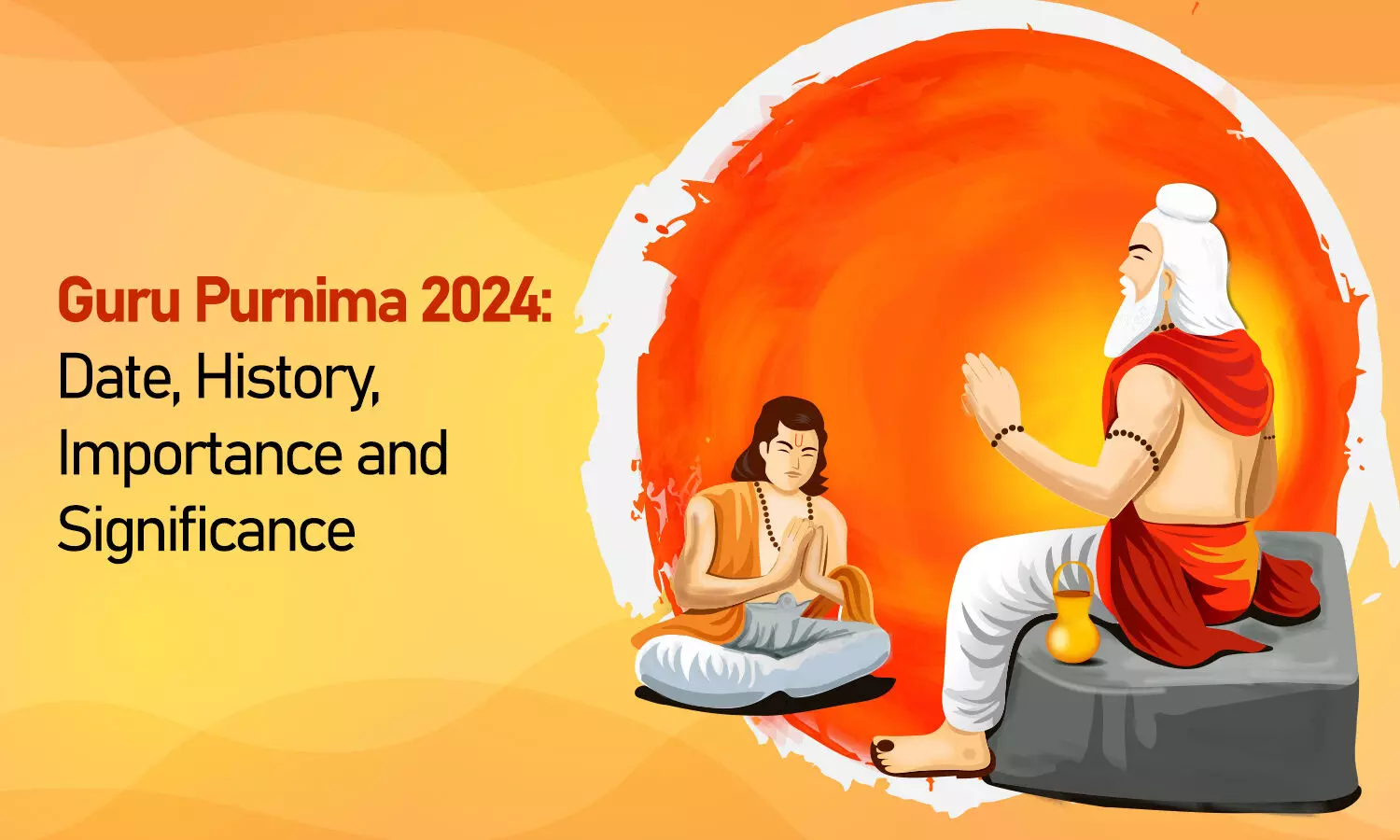Guru Purnima 2024 - History, Significance, and Importance

Guru Purnima 2024 - History, Significance, and Importance
Explore the history, cultural significance, and rituals of Guru Purnima and how this festival is celebrated for spiritual enlightenment.
Guru Purnima, celebrated predominantly by Hindus, Jains, and Buddhists, holds profound cultural and spiritual significance. Falling on the full moon day (Purnima) in the Hindu month of Ashadha (June-July), Guru Purnima in 2023 will be observed on July 3rd. This auspicious day is dedicated to honouring gurus or teachers who play a pivotal role in imparting knowledge, wisdom, and spiritual guidance to their disciples.
Historical Origins
The term "Guru Purnima" derives from Sanskrit, where "Guru" signifies the remover of darkness and "Purnima" denotes the full moon day, symbolising the time of fullness and completeness. Historically, the festival traces its roots back to ancient India, where teachers, revered for their role in enlightening minds and dispelling ignorance, were celebrated through rituals, prayers, and acts of gratitude by their disciples.
Cultural and Spiritual Significance
Guru Purnima transcends religious boundaries and is celebrated with equal fervour by Hindus, Jains, and Buddhists, each adding their unique interpretations and rituals to the occasion. In Nepal, it is also recognised as Teacher’s Day, underscoring its broader cultural relevance beyond the Indian subcontinent. The festival highlights the profound relationship between gurus (teachers) and shishyas (disciples), emphasising the transfer of spiritual knowledge, moral values, and life skills from one generation to another.
Legends and Mythological Narratives
Several legends enrich the spiritual tapestry of Guru Purnima across different traditions:
- Ved Vyasa - Revered as one of the greatest sages in Hindu mythology, Ved Vyasa is credited with compiling and categorising the Vedas, the ancient scriptures of Hinduism. Guru Purnima is also known as Vyasa Purnima, commemorating his birth anniversary and honouring his contributions to spiritual literature and knowledge dissemination.
- Lord Shiva - According to Hindu mythology, Lord Shiva, the supreme ascetic and yogi, assumed the role of the first guru (Adi Guru) on Guru Purnima. On this day, it is believed that Lord Shiva imparted the profound knowledge of yoga and spiritual wisdom to his first disciples, signaling the inception of the guru-shishya parampara (tradition).
- Buddha's First Sermon - In Buddhism, Guru Purnima commemorates the day when Gautama Buddha, the enlightened sage, delivered his first sermon, known as the Dhammacakkappavattana Sutta, to his five companions at the Deer Park in Sarnath. This pivotal event marked the commencement of Buddha's teachings on the Four Noble Truths and the Eightfold Path, guiding humanity towards liberation from suffering.
- Mahavira and Jainism - Jains celebrate Guru Purnima as the occasion when Lord Mahavira, the 24th Tirthankara and spiritual reformer, initiated his first disciple, Gautama Swami, into the monastic order. This symbolic act highlights the transmission of spiritual teachings and the path to spiritual liberation (moksha) within Jain philosophy.
Rituals and Traditions
Guru Purnima is observed with diverse rituals and customs that vary among different communities and regions, reflecting the rich tapestry of cultural diversity within India and beyond:
- Puja and Offerings- Devotees perform special prayers (pujas) and offer floral tributes, fruits, sweets, and incense to their gurus as a token of reverence and gratitude for their guidance and teachings.
- Fasting and Austerity - Some followers observe a strict fast or practice austerity on Guru Purnima as a mark of devotion and spiritual discipline, seeking purification and spiritual enlightenment through self-restraint and introspection.
- Discourses and Satsangs - Spiritual discourses (satsangs), lectures, and discussions are organized in ashrams, temples, and spiritual centers to spread the teachings of gurus and their profound impact on spiritual growth and personal transformation.
- Charity and Seva - Acts of charity (dana) and selfless service (seva) are encouraged on Guru Purnima as expressions of compassion, generosity, and social responsibility. Devotees engage in charitable activities such as feeding the poor, donating to educational institutions, and supporting humanitarian causes to honor the spirit of selflessness and benevolence.
Modern Relevance and Celebrations
In contemporary times, Guru Purnima continues to resonate as a day of introspection, spiritual renewal, and gratitude towards teachers who inspire and guide individuals on their spiritual journey. Educational institutions, spiritual organizations, and communities organize cultural programs, seminars, and workshops centered on the theme of spiritual enlightenment, wisdom, and the significance of the guru-disciple relationship.
Guru Purnima stands as a timeless celebration of the profound bond between teachers and students, transcending temporal and cultural boundaries to embody universal values of wisdom, guidance, and reverence. By honoring gurus on Guru Purnima, devotees not only express gratitude for personal guidance and mentorship but also uphold the enduring legacy of spiritual wisdom that continues to illuminate lives and inspire generations worldwide.
As individuals pay homage to their gurus on Guru Purnima, they reaffirm their commitment to lifelong learning, spiritual growth, and the preservation of ancient traditions that enrich humanity with profound insights and timeless teachings.








